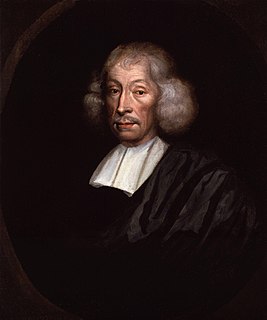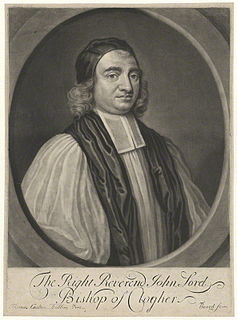Related Research Articles

John Ray FRS was a Christian English naturalist widely regarded as one of the earliest of the English parson-naturalists. Until 1670, he wrote his name as John Wray. From then on, he used 'Ray', after "having ascertained that such had been the practice of his family before him". He published important works on botany, zoology, and natural theology. His classification of plants in his Historia Plantarum, was an important step towards modern taxonomy. Ray rejected the system of dichotomous division by which species were classified according to a pre-conceived, either/or type system, and instead classified plants according to similarities and differences that emerged from observation. He was among the first to attempt a biological definition for the concept of species, as "as a group of morphologically similar organisms arising from a common ancestor". Another significant contribution to taxonomy was his division of plants into those with two seedling leaves (dicotyledons) or only one (monocotyledons), a division used in taxonomy today.

Isaac Hawkins Browne FRS was an English politician and poet. He is remembered as the author of some clever imitations of contemporary poets Jonathan Swift and Alexander Pope on the theme of A Pipe of Tobacco (1736), somewhat analogous to the Rejected Addresses of a later day. He also wrote a Latin poem on the immortality of the soul, De Animi Immortalitate (1754).

William Lort Mansel was an English churchman and Cambridge fellow. He was Master of Trinity College, Cambridge from 1798 to his death in 1820, and also Bishop of Bristol from 1808 to 1820.
Events from the year 1732 in Ireland.
Eubule Thelwall was Principal of Jesus College, Oxford from 1725 to 1727.

Old Trinity Church, also known as Trinity Church, Oxford, is a historic Episcopal church established in 1696. in Oxford Township, Pennsylvania, which is now part of Philadelphia.
Welbore Ellis (1651?–1734) was an English bishop of Kildare, bishop of Meath and Irish privy councillor.
Roger Gale was an English scholar and antiquary as well as a Whig politician who sat in the English and British House of Commons from 1705 to 1713. His father was an ecclesiastic and professor at Cambridge, which the younger Gale also attended. After his graduation, Gale briefly served as a diplomat in France, as well as holding a position as a reader at Oxford University's Bodleian Library. On his father's death in 1702, Gale retired to his family estate, but was elected to Parliament in 1705, where he served until 1713. He then continued in public service until 1735, when he once more retired to his estates.
Colonel Thomas de Burgh, always named in his lifetime as Thomas Burgh, was an Irish military engineer, architect, and Member of the Parliament of Ireland. He designed a number of the large public buildings of Dublin including the old Custom House (1704–6), Trinity College Library (1712–33), Dr Steevens' Hospital (1719), the Linen Hall (1722), and the Royal Barracks.
Thomas Conyers of Elemore Hall, County Durham was an English Tory politician who sat in the English House of Commons between 1695 and 1708 and in the British House of Commons from 1708 to 1727.
Edward Trelawney, of Coldrenick, near Liskeard, Cornwall, was an English clergyman who served as Dean and Archdeacon of Exeter between 1717 and 1726.
Thomas Smyth (1650–1725) was a Church of Ireland clergyman who served as Bishop of Limerick from 1695 to 1725.

John Sterne (1660–1745) was an Irish churchman, bishop of Dromore from 1713 and then bishop of Clogher from 1717.
Henry Knollys, of Grove Place, Nursling, Hampshire, was a British politician who sat in the House of Commons from 1722 to 1734.
Dillon Ashe, D.D. (1666-1724)was an Anglican Archdeacon in Ireland in the first half of the eighteenth century.
Sir Robert Bankes Jenkinson, 4th Baronet, was a British lawyer and politician who sat in the House of Commons from 1717 to 1727.
Thomas Dore was M.P. for Lymington from 1690 to 1705.
William Smyth was an Irish Anglican priest.
Henry Smith (1705-1765) was an 18th-century Irish Anglican priest.
William Twigge (1657–1727) was an Anglican priest in Ireland in the late 17th and early 18th centuries.
References
- ↑ Alumni Oxon
- ↑ Country Life ‘The Chapel of Trinity College, Oxford: A return to splendour’ John GoodallApril 2, 2018
- ↑ Hopkins, Clare (2005), Trinity: 450 years of an Oxford college community (2007 reprint ed.), Oxford, ISBN 978-0-19-951896-8
